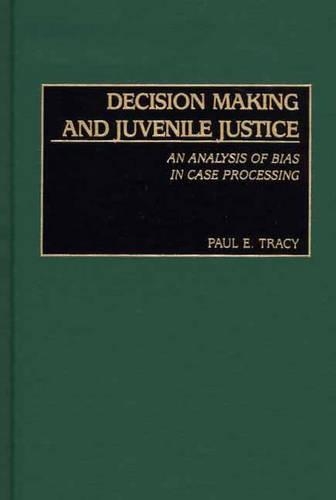
Decision Making and Juvenile Justice: An Analysis of Bias in Case Processing
(Hardback)
Publishing Details
Decision Making and Juvenile Justice: An Analysis of Bias in Case Processing
By (Author) Paul E. Tracy
Bloomsbury Publishing PLC
Praeger Publishers Inc
30th March 2002
United States
Classifications
Tertiary Education
Non Fiction
Penology and punishment
Social discrimination and social justice
Ethnic studies / Ethnicity
Racism and racial discrimination / Anti-racism
364.36
Physical Properties
Hardback
208
Description
Based on a comprehensive study of three counties in Texas, this work examines the idea of differential handling of minority youth offenders. Traditional wisdom indicates that minorities are over-represented in the juvenile justice system due to racism and discrimination within the system itself. The author refutes this logic by challenging current studies and examining the results of the Texas study. The findings suggest that minorities are represented in the juvenile justice system in greater numbers than their majority offender counterparts due to their greater involvement in criminal activity, not to any differential treatment they may receive at crucial decision points within the system. Allegations of racial bias against the juvenile justice system are often supported by the federal government, which suggests that minorities continue to be targeted more frequently for arrest, prosecution, conviction, and imprisonment merely because they are persons of color. Drawing on new research, the author addresses racial disparity in the juvenile justice system and contends that previous research suffers methodological and statistical analysis problems, resulting in the mischaracterization of the issue of racial bias. The present study argues that most minority juveniles receive different case outcomes because of the severity of their current offense, and both the length and severity of their prior delinquency careers. Tracy's research ultimately indicates that rather than being discriminatory, the juvenile system is, instead, reacting to a particular type of delinquent using legally permissible guidelines.
Reviews
[T]racy has provided a well-documented political and legal history of the development of federal mandates to eliminate disproportionate minority representation in state juvenile justice systems.-American Journal of Sociology
This study of the over-representation of racial minorities in the juvenile justice system looks at the relevant decision-making patterns in three counties, and presents data from a survey of juvenile justice practitioners. The book also examines previous studies, identifying their limitations and shortcomings.-Reference & Research Book News
"Tracy has provided a well-documented political and legal history of the development of federal mandates to eliminate disproportionate minority representation in state juvenile justice systems."-American Journal of Sociology
"[T]racy has provided a well-documented political and legal history of the development of federal mandates to eliminate disproportionate minority representation in state juvenile justice systems."-American Journal of Sociology
"This study of the over-representation of racial minorities in the juvenile justice system looks at the relevant decision-making patterns in three counties, and presents data from a survey of juvenile justice practitioners. The book also examines previous studies, identifying their limitations and shortcomings."-Reference & Research Book News
Author Bio
PAUL E. TRACY is Professor of Criminology, Sociology and Political Economy at The University of Texas, Dallas.
